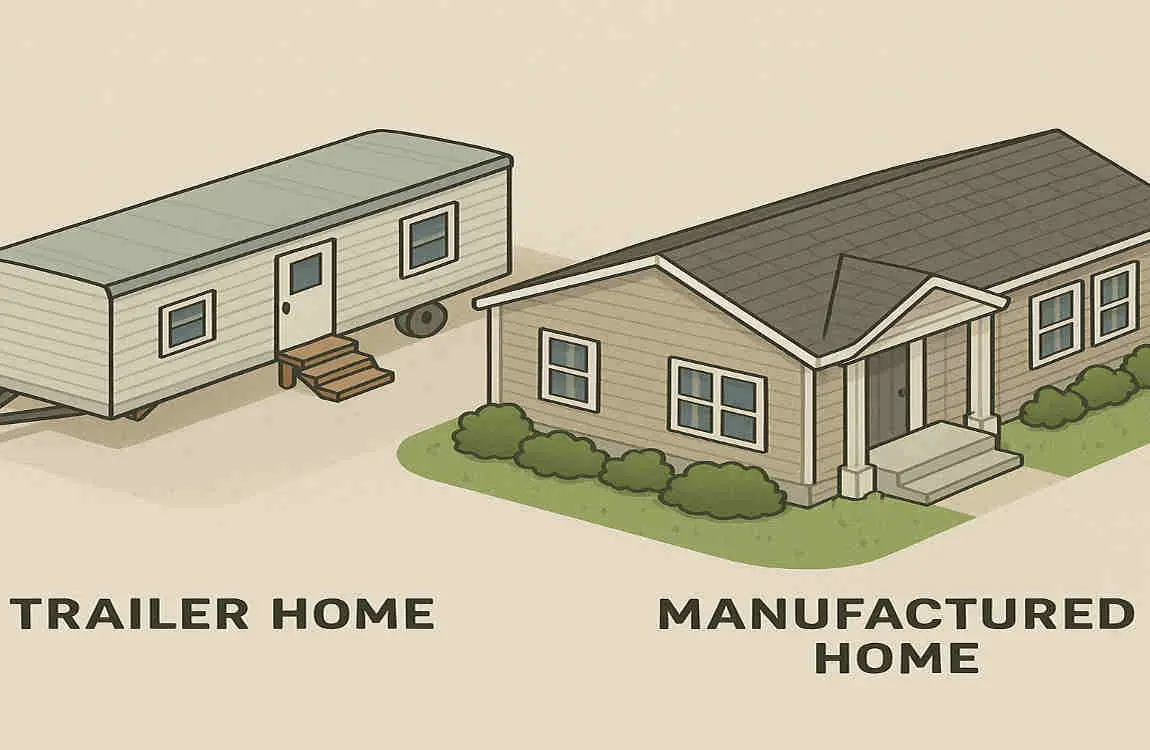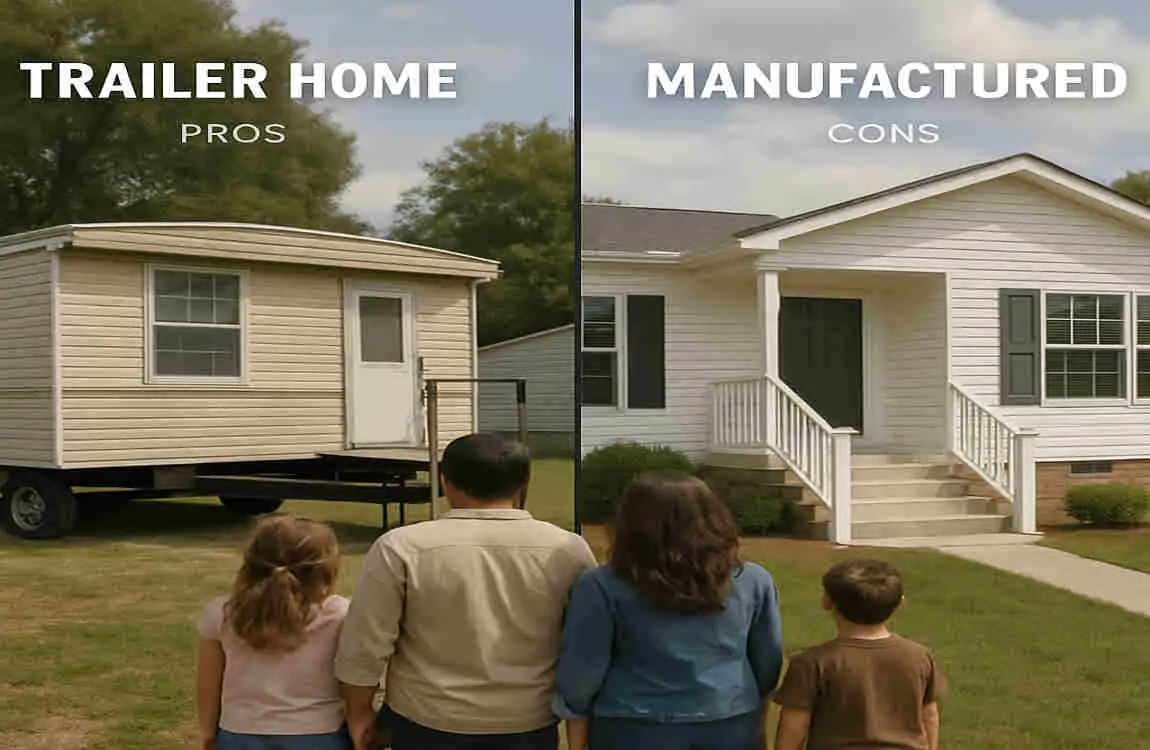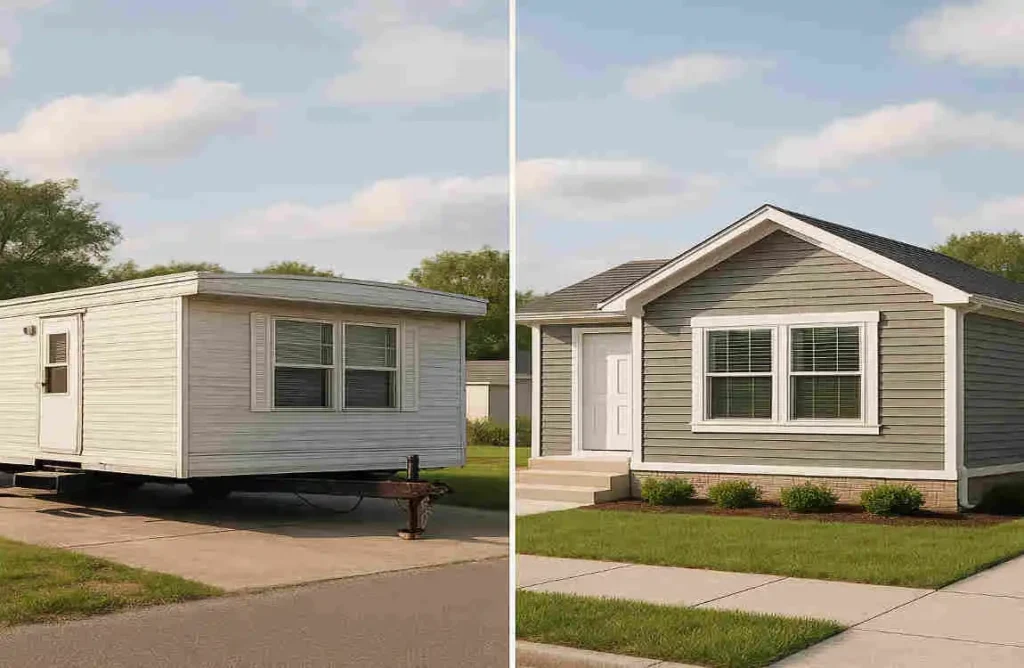Are you considering alternative housing options in 2025? With the rising popularity of trailers and manufactured homes, it’s crucial to understand the key differences between these two types of dwellings
Understanding the Basics

Before we dive into the specifics, let’s start with the fundamentals.
What is a Trailer (Mobile Home)?
A trailer, also known as a mobile home, is a prefabricated structure built in a factory and transported to a site for installation. These homes are designed to be mobile, allowing owners to relocate them with relative ease from one location to another.
What is a Manufactured Home?
A manufactured home, on the other hand, is also built in a factory but is designed to be permanently installed on a specific site. These homes are constructed to meet specific building codes and standards set by the U.S. Department of Housing and Urban Development (HUD).
Historical Context and Evolution
Both trailers and manufactured homes have a rich history dating back to the early 20th century. Initially designed as temporary housing solutions, these options have evolved over time to become more permanent and customizable. Understanding this context helps us appreciate the differences between the two.
Common Misconceptions and Why Clear Differentiation Matters
Many people mistakenly use the terms “trailer” and “manufactured home” interchangeably, but as we’ll see, there are significant differences between the two. Clearing up these misconceptions is essential for buyers and homeowners to make informed decisions.
Key Differences Between Trailers and Manufactured Homes
Now, let’s explore the key differences between trailers and manufactured homes in more detail.
Construction Standards and Regulations
HUD Code for Manufactured Homes (Post-1976)
Manufactured homes built after 1976 must adhere to the HUD Code, a set of federal standards that ensure these homes meet specific safety and quality requirements. This code covers aspects such as design, construction, and installation.
State and Local Regulations for Trailers (Pre-1976 or Older Models)
Trailers, particularly those built before 1976, are subject to state and local regulations rather than federal standards. This can lead to variations in quality and safety across different regions.
Structural Differences
Frame Construction and Materials
Manufactured homes typically feature a more robust frame construction, utilizing materials such as steel or wood to create a sturdy foundation. Trailers, on the other hand, may have a lighter frame designed for mobility.
Permanency and Mobility Features
Manufactured homes are designed to be permanent installations, featuring permanent foundations and utility connections. Trailers, as the name suggests, are built with mobility in mind, featuring wheels and a tow hitch for easy transportation.
Design and Size Options
Customization Possibilities
Both trailers and manufactured homes offer customization options; however, manufactured homes generally provide more flexibility in terms of size, layout, and design. This is because they are built to be permanent installations, allowing for more extensive modifications.
Layout and Aesthetic Differences
Trailers tend to have a more compact layout due to their mobile nature, while manufactured homes can offer a wider range of floor plans and aesthetic styles. This difference in layout and design can significantly impact the overall living experience.
Foundations and Installation
Permanent Foundation vs. Transportable Setups
Manufactured homes are typically installed on a permanent foundation, such as a concrete slab or piers, which provides stability and durability. Trailers, on the other hand, can be set up on various types of foundations, including temporary or transportable setups.
Impact on Stability, Insurance, and Resale Value
The type of foundation used can significantly impact the stability, insurance costs, and resale value of the home. Manufactured homes on permanent foundations tend to have higher stability and resale value, while trailers on transportable setups may face more challenges in these areas.
Longevity and Durability
Lifespan Expectations
Manufactured homes, when properly maintained, can have a lifespan of 30 to 50 years or more. Trailers, due to their mobile nature and potential for wear and tear during transportation, may have a shorter lifespan of 20 to 30 years.
Maintenance Requirements
Both trailers and manufactured homes require regular maintenance to ensure longevity and durability. However, trailers may require more frequent upkeep due to their mobility and exposure to the elements during transportation.
Financial Considerations
When deciding between a trailer and a manufactured home, it’s essential to consider the financial implications.
Typical Cost Differences in 2025
In 2025, the average cost of a new trailer ranges from $40,000 to $100,000, depending on its size, features, and location. Manufactured homes, on the other hand, can cost anywhere from $60,000 to $150,000 or more, depending on similar factors.
Financing Options and Loan Availability Differences
Financing options for trailers and manufactured homes can vary. Manufactured homes are often eligible for traditional mortgage financing, while trailers may require specialized loans or personal funding. It’s crucial to research and compare the available options to find the best fit for your financial situation.
Insurance Costs and Coverage Distinctions
Insurance costs and coverage can differ between trailers and manufactured homes. Manufactured homes on permanent foundations may be eligible for standard homeowners’ insurance, while trailers may require specialized mobile home insurance. Understanding these distinctions is vital for protecting your investment.
Impact on Property Taxes and Land Ownership
The type of home you choose can also impact your property taxes and land ownership. Manufactured homes on owned land may be subject to property taxes, while trailers in mobile home parks may have different tax structures. Additionally, owning land can provide more stability and control over your living situation.
Pros and Cons for Buyers and Homeowners

Now, let’s weigh the advantages and limitations of both trailers and manufactured homes.
Advantages of Trailers
- Affordability: Trailers are generally more affordable than manufactured homes, making them an attractive option for budget-conscious buyers.
- Mobility: The ability to move your home easily is a significant advantage for those who value flexibility and the ability to relocate.
- Simplicity: Trailers often have a simpler design and layout, which can appeal to those who prefer a more minimalist lifestyle.
Advantages of Manufactured Homes
- Permanency: Manufactured homes offer a more permanent living solution, providing stability and a sense of rootedness.
- Customization: With more flexibility in design and size, manufactured homes allow for greater personalization to suit your specific needs and preferences.
- Resale Value: Manufactured homes on permanent foundations tend to have a higher resale value compared to trailers.
Limitations and Challenges of Each Option
- Trailers:
- Potential for wear and tear during transportation
- Limited customization options
- Potential challenges with insurance and financing
- Manufactured Homes:
- Higher upfront cost
- Less mobility compared to trailers
- May require more extensive site preparation and installation
Scenarios Best Suited for Trailers vs. Manufactured Homes
- Trailers:
- Ideal for those who prioritize affordability and mobility
- Suitable for temporary or seasonal living situations
- Great for those who prefer a minimalist lifestyle
- Manufactured Homes:
- Best for those seeking a more permanent and customizable living solution
- Suitable for families or those planning to stay in one location long-term
- Ideal for those who value stability and potential resale value
Legal and Zoning Implications
When considering a trailer or manufactured home, it’s essential to understand the legal and zoning implications in 2025.
Zoning Laws Affecting Trailers and Manufactured Homes
Zoning laws can vary significantly from one location to another, impacting where trailers and manufactured homes can be placed. Some areas may have specific zoning regulations for mobile home parks, while others may have restrictions on manufactured homes in certain neighborhoods.
Permitting and Inspection Requirements
Both trailers and manufactured homes may require permits and inspections during the installation process. Manufactured homes, due to their permanent nature, may have more stringent requirements, while trailers may have simpler permitting processes.
Impact on Neighborhood Acceptance and Community Living
The type of home you choose can also impact neighborhood acceptance and community living. Some communities may have specific rules or restrictions regarding trailers or manufactured homes, so it’s essential to research and understand these factors before making a decision.
Environmental and Energy Efficiency Considerations
In 2025, environmental and energy efficiency considerations are more important than ever when choosing a home.
Energy Standards Compliance for Manufactured Homes
Manufactured homes must comply with specific energy efficiency standards set by the HUD Code. These standards help ensure that manufactured homes are designed and built to be energy-efficient, reducing their environmental impact and utility costs.
Environmental Footprint Comparison
Both trailers and manufactured homes have an environmental footprint, but the impact can vary. Manufactured homes, with their permanent foundations and larger size, may have a higher initial ecological impact during construction. However, trailers, due to their mobility and potential for multiple relocations, may have a higher long-term environmental footprint.
Opportunities for Green Upgrades and Sustainability
Both trailers and manufactured homes offer opportunities for green upgrades and sustainability. From energy-efficient appliances and insulation to solar panels and water-saving fixtures, there are numerous ways to make your home more environmentally friendly, regardless of the type you choose.
Market Trends and Buyer Preferences in 2025
Understanding current market trends and buyer preferences can help you make a more informed decision when choosing between a trailer and a manufactured home.
Current Market Outlook for Trailers and Manufactured Homes
In 2025, the market for both trailers and manufactured homes is expected to remain strong, driven by factors such as affordability, flexibility, and the ongoing housing shortage. However, the specific demand and availability can vary depending on location and economic conditions.
Demographic Trends and Buyer Priorities
Different demographic groups may have varying priorities when it comes to trailers and manufactured homes. Younger buyers may prioritize affordability and mobility, while older buyers may value stability and customization. Understanding these trends can help you align your choice with your specific needs and lifestyle.
Innovations Impacting Both Housing Options
The trailer and manufactured home industries are constantly evolving, with new innovations and technologies shaping the future of these housing options. From modular construction techniques to smart home features, these advancements can impact the quality, efficiency, and overall living experience of both trailers and manufactured homes.
How to Decide: Which Option is Right for You?
Choosing between a trailer and a manufactured home is a significant decision that requires careful consideration. Here’s a checklist to help you make the right choice for your needs and lifestyle.
Checklist Questions for Buyers and Homeowners
- What is your budget for purchasing and maintaining a home?
- Do you prioritize mobility or permanency in your living situation?
- What are your customization and design preferences?
- How important is stability and potential resale value to you?
- What are the zoning and legal requirements in your desired location?
- How do you feel about the environmental impact of your housing choice?
- What are your long-term housing goals and plans?
Key Factors to Consider: Budget, Mobility Needs, Permanence, and Lifestyle
When deciding between a trailer and a manufactured home, it’s essential to weigh factors such as budget, mobility needs, permanence, and lifestyle. Consider how each option aligns with your priorities and long-term goals to make the best choice for your unique situation.
Tips for Touring and Evaluating Both Types of Homes
Before making a decision, take the time to tour and evaluate both trailers and manufactured homes. Visit showrooms, attend open houses, and speak with current owners to get a firsthand look at the pros and cons of each option. Ask questions, take notes, and compare the features and benefits that matter most to you.
Where to Find Reliable Sellers, Dealers, and Resources
Finding reliable sellers, dealers, and resources is crucial when purchasing a trailer or manufactured home. Research reputable companies, read reviews, and ask for recommendations from friends and family. Utilize online resources, such as manufacturer websites and industry associations, to gather information and connect with trusted professionals in the field.
